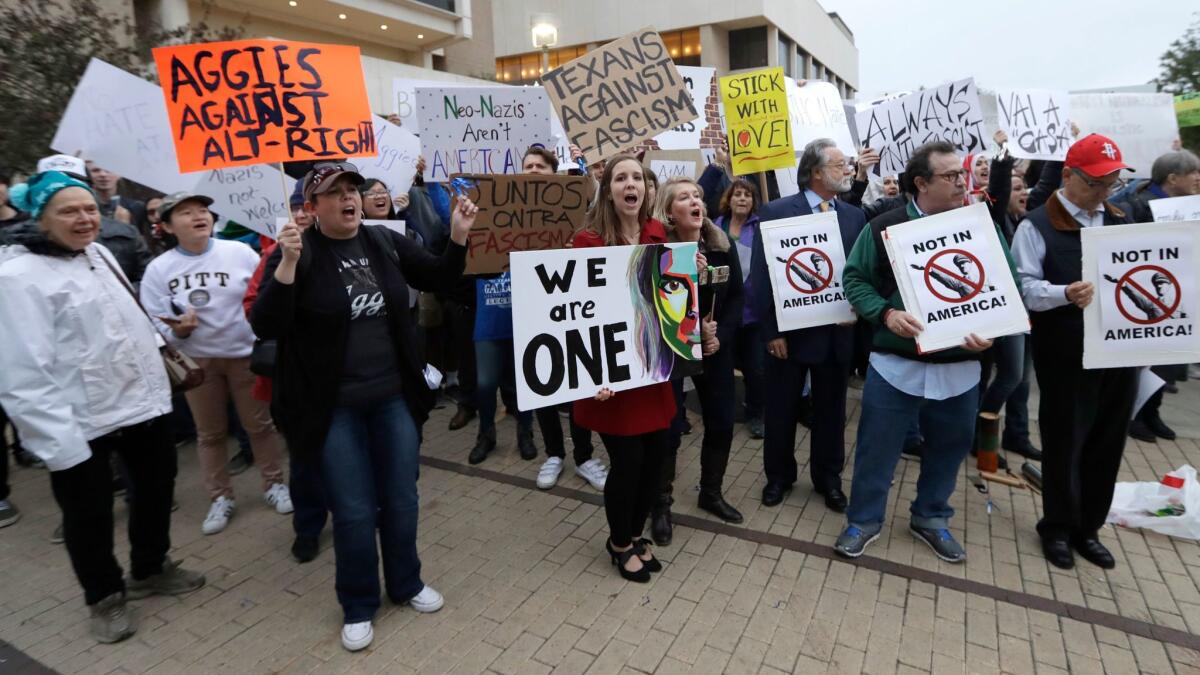Op-Ed: Bigots at the gate: Universities shouldn’t duck the fight against white nationalism

- Share via
Across the nation we are witnessing a rise in white nationalism: At a gathering in a Washington, D.C., hotel, audience members gave a Nazi salute; swastikas are popping up on public buildings; cyber hate and cyberbullying are surging. The F.B.I. reports a 6% increase in hate crimes in 2016 over the previous year, fueled by attacks on Muslims. The Southern Poverty Law Center reported nearly 900 accounts of harassment in the 10 days after the presidential election.
And this activity is coming to our college campuses.
The white supremacist Richard Spencer traveled to Texas A&M to make the case that, “At the end of the day, America belongs to white men.” Nathan Damigo, a person referred to by this newspaper as “emblematic of the young, web-savvy racists who are trying to intellectualize and mainstream bigotry,” is setting his sights on higher education, eager for the attention brought on by hostile audiences or for the opportunity to claim victimization if denied a venue.
Hate speech is like mold: Its enemies are bright light and fresh air.
There have been calls to ban these speakers from campus, and in some cases controversial figures have been blocked or disinvited. No doubt many campus leaders, faculty and students are hoping that the likes of Spencer and Damigo will skip them, never darkening their quads and campaniles.
But I think there’s a better response: Confront the problem head-on.
As raw and painful as the resulting interactions might be, they represent an opportunity to educate students and society more generally on how to recognize and mount an effective attack against hatred, bigotry, ignorance and bullying.
Universities support free speech and condemn censorship for two reasons — to ensure that positive, helpful, illuminating messages can circulate widely, and to expose hateful or dangerous ideas that, if never engaged or rebutted, would gain traction in the darker corners of our society. Hate speech is like mold: Its enemies are bright light and fresh air.
Whenever we encounter hateful and demeaning ideas on campus, we mustn’t run away; we must — and will — double down on asserting our essential commitment to human dignity and respect. This is what Texas A&M did so effectively when it countered Spencer’s talk with its “Aggies United” event denouncing hatred and bigotry.
Piecemeal responses aren’t enough, though. Too many people, on and off campus, were caught off guard by the reemergence of white nationalism. At the beginning of the year, few people had even heard the term “alt-right,” let alone knew what it signified.
This represents a failure of education, as well as the much-discussed failure of journalism.
Because the fundamental mission of colleges and universities is to advance understanding about important matters, we must marshal our scholarly resources to explore more systematically this dangerous national and global phenomenon.
On my campus, we will be working with all the relevant schools and disciplines to educate our community about current events, the historical and global dynamics underlying the politics of hate, and the related threat of authoritarianism. Some of this programming will be designed for a broader audience of students and community members. We will also bring together scholars from around the world to plan research agendas, share the results of the best studies, and debate various theories and hypotheses about the short- and long-term consequences of these developments.
At issue, ultimately, is not merely the very real experience of pain and outrage that accompanies contact with hateful speech. It’s the ability of free, diverse and democratic societies to maintain their essential practices and values.
This moment is about much more than the consequences of allowing an ignorant speaker or two to express themselves on a campus.
Democracies are more fragile things than we might like to believe. The World Value Survey recently reported a dramatic uptick in the percentage of people who believe it is a good thing to have a strong leader without elections or parliament. Universities must rise to the occasion by learning more and teaching more about what is happening, where it is happening, why it is happening and how it might be most effectively addressed.
Howard Gillman is a professor of law, political science and history, and the chancellor of UC Irvine. He is co-author, with Erwin Chemerinsky, of the forthcoming book “Free Speech on Campus.”
Follow the Opinion section on Twitter @latimesopinion and Facebook
More to Read
A cure for the common opinion
Get thought-provoking perspectives with our weekly newsletter.
You may occasionally receive promotional content from the Los Angeles Times.










